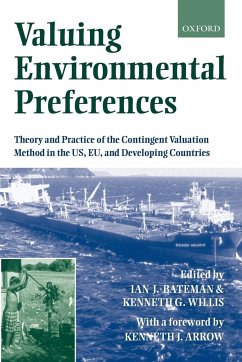an interesting experimental tool regardless of the question of absolute validity of estimates. The book embraces the theoritical, methodologicl, empirical, and institutional aspects of the current debate. It covers US, European , and developing country applications, and the institutional frameworks within which CV studies are applied.
This is a comprehensive and up-to-date treatment of the Contingent Valuation Method (CVM) which asks what people would be willing to pay for an environmental good or attribute, or willing to accept for its loss. CVM is currently central to the assessment of environmental damage and has been the subject of considerable debate, especially in the case of the Exxon Valdez disaster in Alaska. Aimed at specialists, this book contains specially commissioned papers from both sides of that debate, as well as from commentators who see it as an interesting experimental tool regardless of the question of absolute validity of estimates.
Hinweis: Dieser Artikel kann nur an eine deutsche Lieferadresse ausgeliefert werden.
This is a comprehensive and up-to-date treatment of the Contingent Valuation Method (CVM) which asks what people would be willing to pay for an environmental good or attribute, or willing to accept for its loss. CVM is currently central to the assessment of environmental damage and has been the subject of considerable debate, especially in the case of the Exxon Valdez disaster in Alaska. Aimed at specialists, this book contains specially commissioned papers from both sides of that debate, as well as from commentators who see it as an interesting experimental tool regardless of the question of absolute validity of estimates.
Hinweis: Dieser Artikel kann nur an eine deutsche Lieferadresse ausgeliefert werden.








